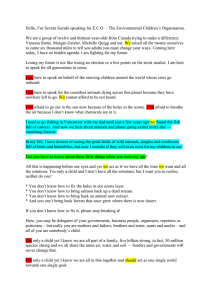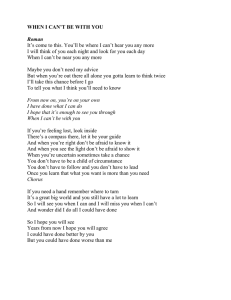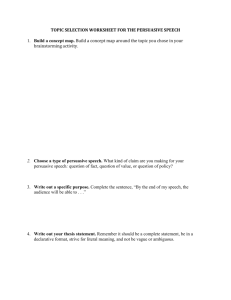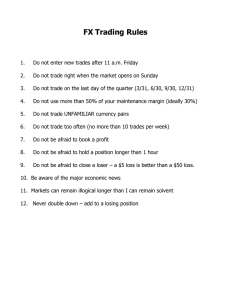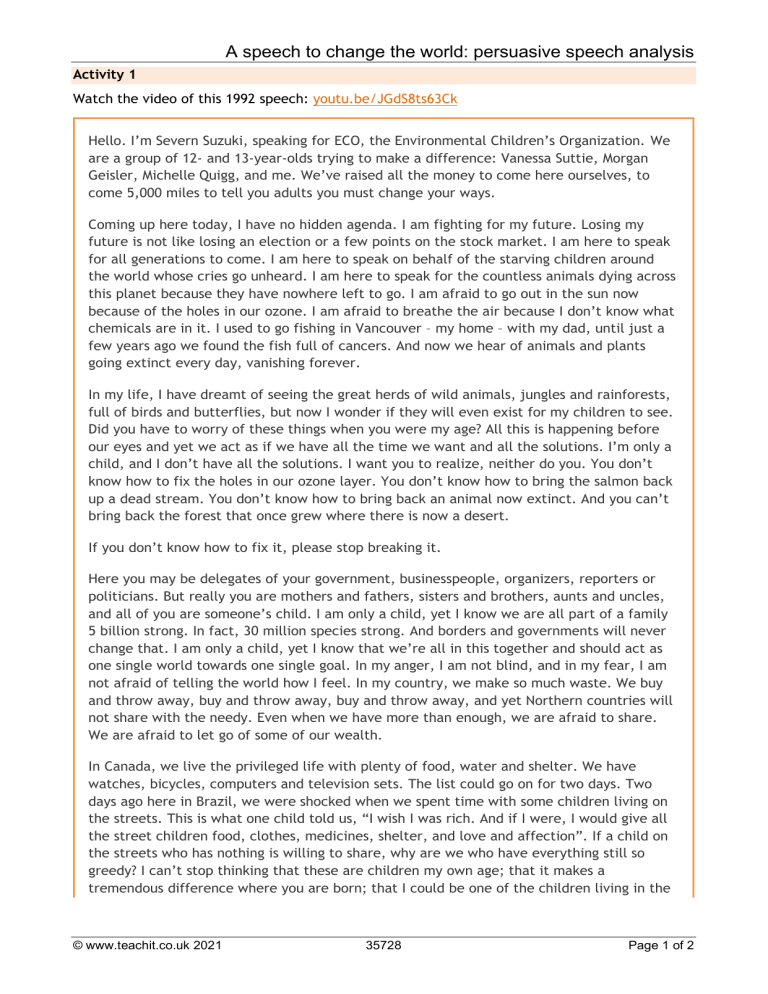
A speech to change the world: persuasive speech analysis Activity 1 Watch the video of this 1992 speech: youtu.be/JGdS8ts63Ck Hello. I’m Severn Suzuki, speaking for ECO, the Environmental Children’s Organization. We are a group of 12- and 13-year-olds trying to make a difference: Vanessa Suttie, Morgan Geisler, Michelle Quigg, and me. We’ve raised all the money to come here ourselves, to come 5,000 miles to tell you adults you must change your ways. Coming up here today, I have no hidden agenda. I am fighting for my future. Losing my future is not like losing an election or a few points on the stock market. I am here to speak for all generations to come. I am here to speak on behalf of the starving children around the world whose cries go unheard. I am here to speak for the countless animals dying across this planet because they have nowhere left to go. I am afraid to go out in the sun now because of the holes in our ozone. I am afraid to breathe the air because I don’t know what chemicals are in it. I used to go fishing in Vancouver – my home – with my dad, until just a few years ago we found the fish full of cancers. And now we hear of animals and plants going extinct every day, vanishing forever. In my life, I have dreamt of seeing the great herds of wild animals, jungles and rainforests, full of birds and butterflies, but now I wonder if they will even exist for my children to see. Did you have to worry of these things when you were my age? All this is happening before our eyes and yet we act as if we have all the time we want and all the solutions. I’m only a child, and I don’t have all the solutions. I want you to realize, neither do you. You don’t know how to fix the holes in our ozone layer. You don’t know how to bring the salmon back up a dead stream. You don’t know how to bring back an animal now extinct. And you can’t bring back the forest that once grew where there is now a desert. If you don’t know how to fix it, please stop breaking it. Here you may be delegates of your government, businesspeople, organizers, reporters or politicians. But really you are mothers and fathers, sisters and brothers, aunts and uncles, and all of you are someone’s child. I am only a child, yet I know we are all part of a family 5 billion strong. In fact, 30 million species strong. And borders and governments will never change that. I am only a child, yet I know that we’re all in this together and should act as one single world towards one single goal. In my anger, I am not blind, and in my fear, I am not afraid of telling the world how I feel. In my country, we make so much waste. We buy and throw away, buy and throw away, buy and throw away, and yet Northern countries will not share with the needy. Even when we have more than enough, we are afraid to share. We are afraid to let go of some of our wealth. In Canada, we live the privileged life with plenty of food, water and shelter. We have watches, bicycles, computers and television sets. The list could go on for two days. Two days ago here in Brazil, we were shocked when we spent time with some children living on the streets. This is what one child told us, “I wish I was rich. And if I were, I would give all the street children food, clothes, medicines, shelter, and love and affection”. If a child on the streets who has nothing is willing to share, why are we who have everything still so greedy? I can’t stop thinking that these are children my own age; that it makes a tremendous difference where you are born; that I could be one of the children living in the © www.teachit.co.uk 2021 35728 Page 1 of 2 A speech to change the world: persuasive speech analysis favelas of Rio. I could be a child starving in Somalia, or a victim of war in the Middle East or a beggar in India. I am only a child, yet I know that if all the money spent on war was spent on finding environmental answers, ending poverty and finding treaties, what a wonderful place this Earth would be. At school, even in kindergarten, you teach us how to behave in the world. You teach us to not fight with others. To work things out. To respect others. To clean up our mess. Not to hurt other creatures. To share, not be greedy. Then why do you go out and do the things you tell us not to do? Do not forget why you are attending these conferences – who you are doing this for. We are your own children. You are deciding what kind of world we are growing up in. Parents should be able to comfort their children by saying “Everything’s going to be all right. It’s not the end of the world. And we’re doing the best we can.” But I don’t think you can say that to us anymore. Are we even on your list of priorities? My dad always says, “You are what you do, not what you say.” Well, what you do makes me cry at night. You grownups say you love us, but I challenge you, please make your actions reflect your words. Activity 2 Find and annotate or colour-code the following techniques in the speech from the check list below. Try to explain the effect of each one on the audience. • Emotive language • Direct speech • Use of 1st person plural inclusive pronoun ‘we’ • Use of facts and figures • Use of 2nd person ‘you’ • Rhetorical questions • Anecdotes • Repetition • Imperative verbs • Abstract nouns Activity 3 Persuasive speech writing Plan and write your own persuasive speech on an environmental topic, using as many of the techniques identified in Severn Suzuki’s speech as you can. Here are some topic ideas you could use: • global warming • fossil fuels • endangered species, such as the rhino • deforestation. • water pollution Try to vary your sentence openings and involve your audience in your speech to grab and keep their attention. Plan your speech carefully in paragraphs. © www.teachit.co.uk 2021 35728 Page 2 of 2

